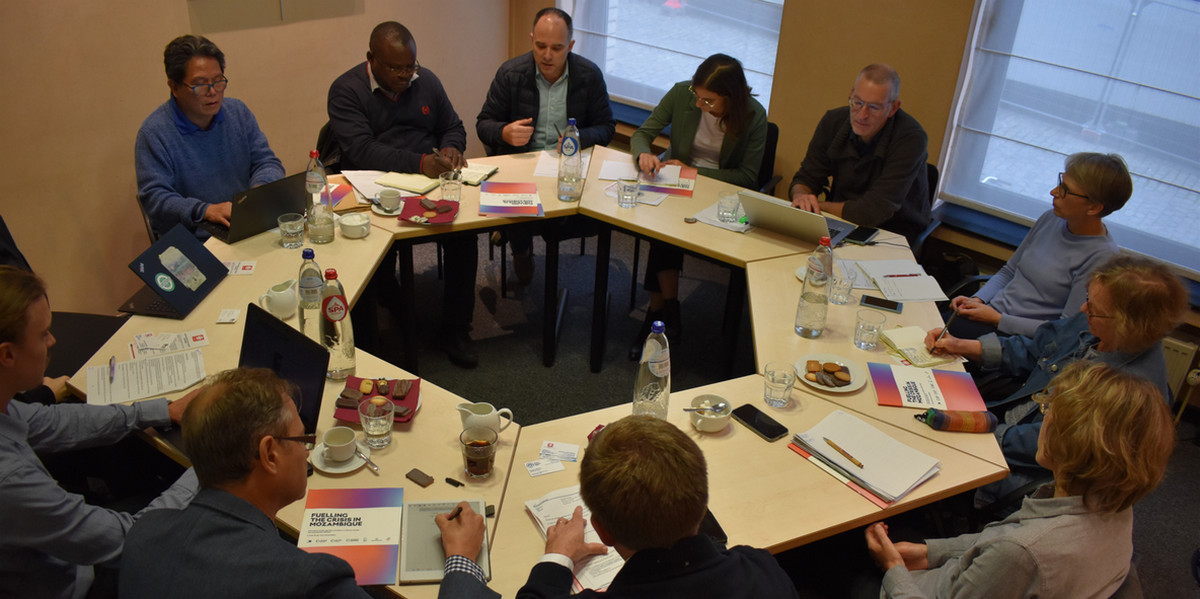Check this page for updates !
A delegation from Mozambique will travel to Europe from 16 October to 4 November 2023 to denounce extractivism and corporate abuse in Cabo Delgado, northern Mozambique. In the context of a degrading local situation, and in the context of ongoing European and international political processes to prevent cases of corporate abuse by transnational corporations.
Where and When
- France: 16-21 October
- Belgium: 22-25 October
- The Netherlands: 26 October – 1st November
- Italy: 2-4 November
The delegation will consist of:
- Antonio Muagerene, Programme Manager, Caritas Nampula
- Erika Mendes, Social and Environmental Activist, Coordinator Corporate Impunity and Human Rights, Justiça Ambiental / Friends of the Earth Mozambique (JA!)
- Daniel Ribeiro, Technical and Research Officer, Justiça Ambiental / Friends of the Earth Mozambique (JA!) and Coordinator of the international No to Gas campaign.
Background
In northern Mozambique, mining and fossil fuel extraction by powerful transnational corporations is closely linked to land grabbing, loss of homes and livelihoods, mass displacement, sexual violence, climate change, war, environmental destruction and economic ruin. Colonisation and land, climate and human rights injustices are deeply intertwined. In 2006/2007, seismic surveys began off the coast of Cabo Delgado. In 2012, commercial quantities of natural gas were discovered in 2 blocks owned by Anadarko (now Total) and ENI. Insurgent attacks began in 2017. The gas and other mega-projects have been identified as catalysts for pre-existing problems of social inequality, unemployment and social infrastructure problems, exacerbated by resettlement processes. The conflict has consistently been blamed on Islamic Jihad groups backed by ISIS. But analysts and victims point to the control of land and mineral resources as the real roots of the conflicts. Local populations are being forced off their land by transnational corporations to make way for their and other prospectors’ projects.
Extreme violence has led to ever-increasing displacement, with devastating consequences for the majority of the population in the war-affected region. The conflict has spilled over into the neighbouring province of Nampula and the war in northern Mozambique is now considered one of the most complex conflicts in Africa and beyond. The presence of European companies such as TotalEnergies and ENI speaks to the need to link local resistance to extractive projects to the energy and consumption model driven by countries in the global North. In addition, research by Friends of the Earth Europe has shown how export credit agencies from the Netherlands, Italy, France, the UK and the US have financed extractive investments and fuelled conflict, despite being well aware of the risks associated with their activities.
Supporting organisations
Caritas Mozambique, Justicia Ambiental (JA!) /FoE Mozambique, Justice, Peace and Development Commission of the Symposium of the Episcopal Conference of Africa and Madagascar (SECAM), Justice and Peace Mozambique, Dioceses of Nampula, IMBISA (Interregional Meeting of the Bishops of Southern Africa), Denis Hurley Peace Institute (DHPI), Mozambique Episcopal Conference Commission for Migrants, Refugees and Displaced Persons (CEMIRDE), International Child Development Programme (ICDP), CIDSE, MISEREOR, CCFD-Terre Solidaire, Focsiv, Friends of the Earth Europe, Les Amis de la Terre, Brot für die Welt, ReCommon.
Resources
- SECAM-JPDC Statement on the UN Binding Treaty, October 2023, Mozambique”
- “Mozambique Coast of Cabo Delgado: Stop Gassing Africa. Leave Fossil Fuel in the Ground” SECAM Policy Brief, October 2023
- Policy Brief Northern Mozambique, 24 February, 2023 (EN)
- “Total faces criminal charges in French courts for its negligence during the Palma attack, in northern Mozambique”, Les Amis de la terre, Press release, 10 October 2023 (EN / FR)
- Fuelling the crisis in Mozambique: How Export Credit Agencies Contribute to Climate Change and Humanitarian Disaster, A case study from Mozambique, Friends of the Earth Europe and Justiça Ambiental (Friends of the Earth Mozambique, May 2022
- “Gas in Mozambique : a windfall for the industry, a curse for the country”, Les Amis de la terre, Justiça Ambiental (JA!) FOE international, 2020: Executive summary (EN) – Full report (PT)
- Au Mozambique, « la présence de Total a mis les gens en danger », interview with Daniel Ribeiro, Technical and Research Officer, Justiça Ambiental by Pierre Cochez, CCFD-Terre Solidaire, 29 October 2023

This initiative is co-founded by the European Union. The contents are the sole responsibility of the organisers and can in no way be taken to reflect the views of the European Union.
Cover photo credit: CIDSE

